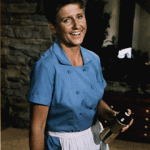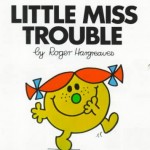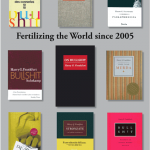 A couple of years ago, STA and I had a great conversation on a long car trip about Carol and Alice. Why were both of these women necessary? What was their relationship like? What exactly did Carol Brady do during the day when Alice was cooking and cleaning and going to the butcher? Was Alice considered a member of the family? When did she ever get a break? Did they really need her with Carol around? Was she ever going to marry Sam?
A couple of years ago, STA and I had a great conversation on a long car trip about Carol and Alice. Why were both of these women necessary? What was their relationship like? What exactly did Carol Brady do during the day when Alice was cooking and cleaning and going to the butcher? Was Alice considered a member of the family? When did she ever get a break? Did they really need her with Carol around? Was she ever going to marry Sam?
I remember watching the two different episodes in which Alice feels like she isn’t needed or wanted anymore and decides that she has to leave. In Alice Doesn’t Live Here Anymore from the first season, Alice feels that she has been replaced by new Mom, Carol. And in Goodbye, Alice, Hello from the fourth season, Alice thinks that the kids don’t like her and don’t want her around anymore. Instead of telling the family that she feels unwanted, she makes up some lame excuse about an Aunt in Sacramento/Seattle who is sick (in Alice Doesn’t Live Here Anymore) and an Uncle who has a great business opportunity for her (in Goodbye, Alice, Hello). I remember thinking, wow, aren’t you just a little too sensitive. Nobody said you weren’t needed. And who cares if the kids like you or not?
Now watching them again with a deeper critical awareness of feminism, the difficulties of caregiving and domestic work, and the politics of family and kinship configurations, I see these episodes very differently. Alice is not being too sensitive. She is not overreacting. She does not need to get over herself (I am sure at some point my younger self must have thought that she should do just that). No, Alice’s reaction and response to thinking and feeling that she was no longer needed was justified. It doesn’t demonstrate that she is overly sensitive and too invested in a family that isn’t hers. Instead, it reflects the tenuous and very difficult position she occupies as the paid caregiver who functions unofficially and invisibly as the Bradys’ other mother.
In almost every episode Alice is represented as the loving (often laughable, arguably queer) housekeeper who is more than a maid; she is an honorary family member. She goes on all of their trips–even their honeymoon! Never mind that she goes along to work (watch the kids, fetch the water for the campsite, walk Tiger the dog). But, even as the Brady family seems to think of her as part of the family, this is not really the case. She is just the hired help.
While Carol might consider her a friend and a confidante, she is not above pulling rank with Alice and demanding that she do something (like in Goodbye, Alice, Hello, when she forces Alice to tell her who broke the lamp. The implied message is that Alice better tell Carol or she will be fired). And while Mike may act as if he respects and values her loyal service, he jokingly links her position as servant/maid with slavery and then laments the fact that he can no longer force her to do his bidding because of Abraham Lincoln. What about the kids? Sure they love her and think of her as a friend (and as comic relief), but they also make sure she knows who has the power in the family (like when Cindy’s secret admirer comes over for their “date.” As she walks by Alice in the kitchen, Cindy commands her to bring them some refreshments).
Alice’s position as a part of the family is tenuous because she is being paid to be there. She is not an equal member. She is an employee with 8 bosses. If she makes a mistake or disobeys the rules, she won’t be reprimanded or given a time out, she will be fired. She will lose her livelihood and her benefits and her living quarters (which, true to form, are right off of the kitchen). Alice’s position is also tenuous because she has no real claim on any of the family members. Sure she has taken care of Bobby his whole life, but if she is fired she can’t demand to be allowed to have a relationship with him. She has been a mother to the kids (and a sexless wife/secretary to Mike) but she has no rights or legal claim to that position. Lucky for her that she is white and a legal citizen of the U.S. Otherwise her position as domestic worker would be even more tenuous. For more on this, see here and here.
Alice’s position is difficult because the kind of work she is doing–cooking, cleaning, drying off tears, counseling heartbroken Marcia, building up Jan’s self-esteem, contending with Greg’s often failed performances of (hyper) masculinity—is not really considered work. Taking care of others is invisible work that is done by individuals (mostly women) who are invisible as workers. Folding the sheets and watching the kids? That’s not work, that’s just what women do while men go to the office and design powder puff buildings for BeeBee Gallini.
Feminist theorists have written a lot (and I mean a lot!) about the undervaluing of “women’s” caregiving as work. But, this isn’t just a problem for housewives who aren’t appreciated for all that they do around the house. This is a problem for the invisible nannies, maids, domestic workers, and servants that actually get paid to do the housework (see this article for a discussion of the moral dilemma that nannies create for femnists). Could the fact that Alice not only recognized but felt (on a daily basis) her tenuous and undervalued position as (secondary in status but primary in actual care) caregiver to the Brady kids and Mike been the reason she reacted so strongly and dramatically in both episodes?
There is (yet) another approach to take on this issue of Alice and her trouble (that is, her tenuous position). While Alice is officially only the paid housekeeper, she is effectively (but without recognition) a second mother to the Brady kids. The trouble with being the second mother is that people just don’t have two mothers. That scenario is not part of the happy heterosexual and patriarchal nuclear family with its one father, one mother and multiple kids. So, her role as a primary caregiver who mothers the children must remain unrecognized (in J Butler speak it is unintelligible within dominant discourse).
But, wait, the trouble is even worse than not being recognized. The happy heterosexual family as the ideal (and natural) kinship configuration is predicated on the belief that 1 dad, 1 mom, many kids is the only healthy and proper way in which to raise kids. So, any indication that other configurations could work (or, horror of horrors, might actually be better for the kids) must, at all costs, be concealed. For this reason, Alice’s role as another mother (and a successful one at that) must not only go unrecognized (and unvalued), it must also be undercut. Alice might do the majority of caring for the children, but she cannot be understood (or represented within the show) as a mother. There is only room for one mother in the Brady household and that mother is happy heterosexual, Mrs. Carol Brady. Maybe that is why Alice is so sensitive. She’s not fooling herself, she knows that she isn’t really a mother to the Bradys and that the love she receives as a caregiver will only last as long as her paycheck does. Or, maybe that is why Alice is represented as having such a dramatic (and selfish) overreaction in the episodes. When she thinks that the kids don’t like her anymore, she doesn’t tough it out like a “real” mother would (I mean, how many times have your kids told you that they hate you. I stopped counting a long time ago). Instead, she runs away. See, the show seems to be reminding us, she isn’t a real mother. Real mothers tough it out. Real mothers don’t leave.
I would have liked to see them (the producers and writers of the show, the kids, Mike and Carol) recognize and represent Alice as another mother. What kind of radical kinship configuration could this have allowed for? The Brady Bunch was already breaking ground by focusing on a “blended” family and subtly injecting the storylines with second wave feminism. Why not queer it up a little too?



